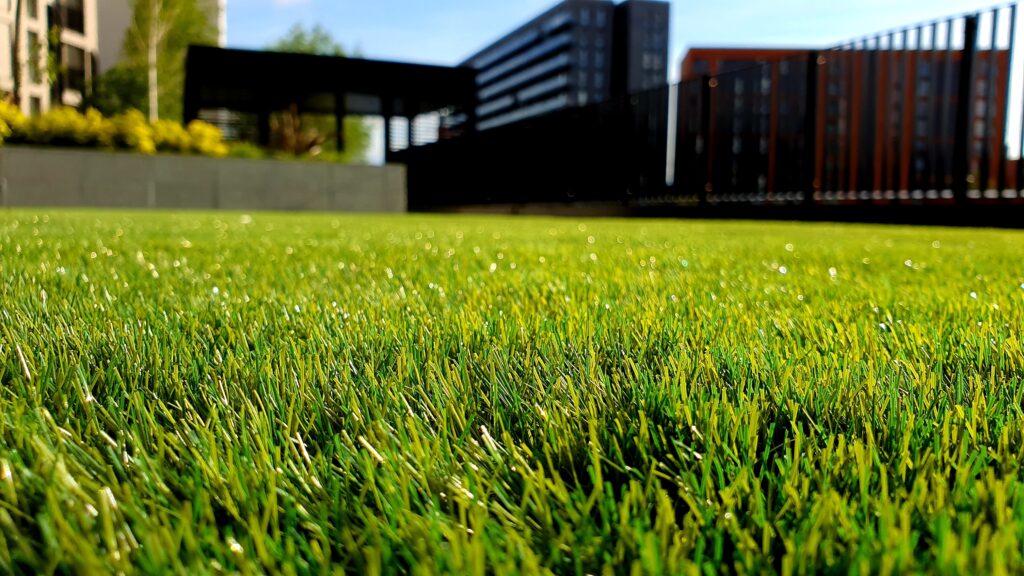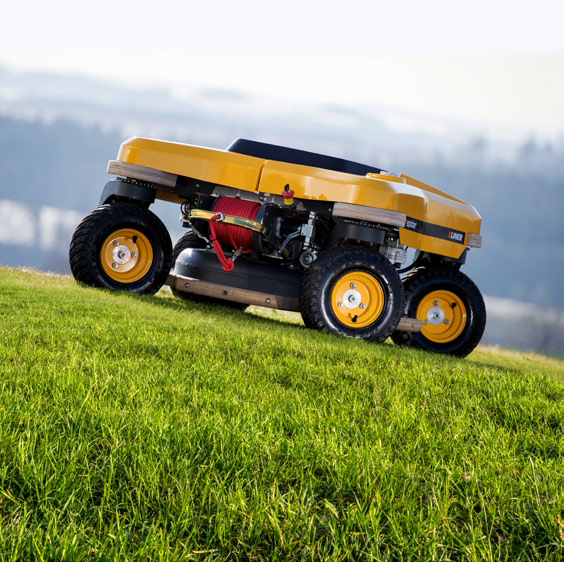When comparing your options for commercial mowers, there’s a lot to consider: Gas or battery-powered? Seated or walk-behind? Corded or cordless? There are a lot of questions you’ll need to answer before you make your decision.
Some of the best commercial mowers are the ones able to handle difficult terrain, even the steepest hills and slopes. Here’s a full breakdown of the five types of commercial mowers so you can make your purchase with confidence.
5 Types of Commercial Mowers
Before you choose your commercial mower, consider the different types of lawns you’ll be working with and what your needs are. There’s really no “one size fits all” for commercial mowers, so choosing the right kind of mower will depend on you and your business.

Tractor Mower
Tractor mowers are what you may typically picture for a riding mower. For a tractor mower, the cutting deck is located under the front of the mower itself. This makes it more maneuverable, but it isn’t ideal for a lawn with high grass and brush that needs to be cleared. Tractor mowers are best-suited for flat surfaces without any kind of shrubbery or trees.
Besides the initial purchase price of a tractor mower, you’ll need to invest in maintenance, labor and other costs like replacement parts. On top of that, liability and safety are two big considerations you need to factor. Tractor mowers aren’t at all suited for steep hills and are actually quite dangerous on slopes. Employees can be injured on the job if the tractor mower tips over.
Zero-Turn
A zero-turn mower is a lawnmower with a mowing deck positioned in front of the machine, rather than underneath (often found in traditional lawn tractors). As its name implies, the mower itself has a turning radius of zero.
It can be a riding mower, walk-behind or stand-on. There are also different accessories and attachments that can be installed on the mower for anything from mulching to snow-plowing.
A zero-turn mower is much easier to maneuver and operate than a tractor mower. However, it should be noted that a zero-turn mower isn’t ideal for slopes or hills and can be a safety hazard or liability to anyone needing to cut grass on steep terrain.
Trail Mower
Trail mowers, also called finish-cut mowers, need to be hooked up to an ATV or riding mower in order to operate. They have no propulsion system of their own, but the engine is mounted on top of the cutting deck.
Trail mowers are best for large, flat areas like fields. You might see them being used on golf courses because they offer a finer finish. However, they are not well-suited for lawns with tall grass, weeds or brush. Additionally, they aren’t safe to use on slopes and can topple over, making them a danger for mower operators on a steep hill.
Walk-Behind
A walk-behind mower is commonly used for smaller lawns. They’re more compact and able to work in tighter areas, whereas a remote-control mower, zero-turn or tractor mower are made for covering larger lawns at higher speeds.
As the name suggests, a walk-behind mower doesn’t have a seat, but it does have more power and some are self-propelled. If you need to cover tight corners like landscaped flower beds in a small area, a walk-behind mower can be a really good option. Similar to the mowers listed above, unfortunately the walk-behind is also another threat to operator safety when dealing with slopes.
Remote-Control
Remote-controlled commercial mowers are uniquely designed and equipped to tackle difficult terrain that would be otherwise inaccessible with any other kind of mower. As mentioned above, with any of the riding mower options, you risk the safety of your operator. The steeper the slope, the more dangerous it can be for your crew of mowers. However, a remote-controlled mower can go where these larger machines can’t.
Remote-controlled mowers are a great option to ensure safety and efficiency at all times. SPIDER mowers, for example, have a climbing ability of up to 60 degrees and is ideal for any terrain type, including short grass or heavy brush. They have the ability to navigate the kind of rough terrain of downhill runs, parks, orchards and more. They combine power and precision for any kind of mowing. Explore the many benefits of SPIDER to learn more today.

How Do I Know Which Mower Is Right For Me?
So, which mower is right for you? That comes down to your needs. There are many features to consider, but at the end of the day, your commercial mower of choice should be the safest option for you and your team to operate—it could cost you thousands if someone were to be injured on the job.
Now that you’re familiar with the different types of commercial mowers on the market, determining the best fit comes down to answering a few simple questions.
Consider Your Needs
When it comes to your business, you want the best commercial mower on the market at a fair price. So, in order to pick the right commercial mower for your business, consider these questions:
- How large are the spaces you typically care for?
- Are there any hills or slopes on them? If so, how steep are they?
- What types of terrain are you dealing with regularly?
- What safety certifications do you want for your equipment?
Answering these questions will help you eliminate the commercial mowers that aren’t powerful or precise enough for your business’s needs. For example, if you typically work with particularly hilly or downslope lawns, a remote-control mower would be the best option. They can be safely operated from a distance, eliminating the hazard of falling like a tractor mower would.
Shop With ROI In Mind
As you consider the features and capabilities your mower needs, you should also consider the value it will provide. These high-powered pieces of equipment can run in the thousands of dollars, but if you choose the right one, you’ll see why your investment was worth it. Choosing a remote-control mower like SPIDER, for example, means investing in equipment that performs as effectively as 15 workers at a time.
Conclusion
The ideal commercial mower for your business will depend on your unique needs and the kinds of terrain you’re servicing at your business. Safety, reliability and power are obviously the most important features for a commercial mower, but your individual needs will be the deciding factor in which commercial mower is best for you. Once you take your needs and goals into consideration, you can choose the right mower for your business with confidence.
(Interested in becoming a dealer for SPIDER? Find out how to get started today.)
Learn About Our All-Terrain Commercial Mowers